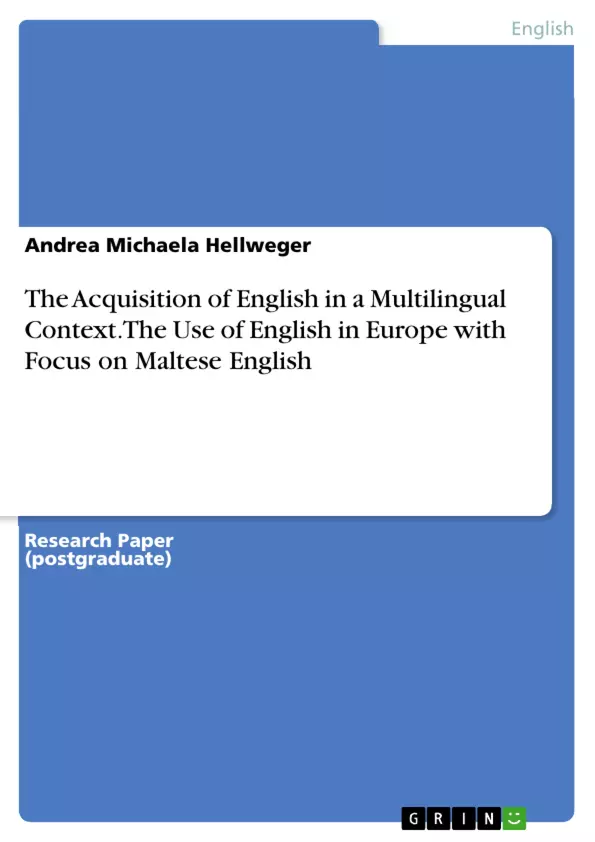This paper implicitly examines detailed aspects about English as an official language, with specific focus on Maltese English. The book "The English Language in Europe" by Hartmann (1996) provides the theoretical foundation and primary literature source for the introduction of this term paper.
The status of English has rapidly changed from the original and ancient language of England and America to an essential tool of international and global communication. English is currently considered the World language, a language everyone should be able to speak in order to communicate with other people from all around the world. In Europe, the concept of English as a world language is widespread and therefore vividly discussed. The research interests lie in the importance of English as an official language in Europe and the development of English in Malta.
Inhaltsverzeichnis (Table of Contents)
- Introduction
- Multilingual Europe
- The Use of English
- History of Malta
- Maltese: Language differences, changes and influences
- Differences in Maltese, Maltese English and English
- Cultural influences and Politeness in Malta
- Further Language Changes in Maltese English
- Maltese English nowadays
- Conclusion
- Bibliography
Zielsetzung und Themenschwerpunkte (Objectives and Key Themes)
This paper explores the significance of English as an official language within Europe, particularly focusing on the development of Maltese English. It draws upon theoretical frameworks provided by Hartmann (1996) and Krug und Rosen (2012) to examine English as a global language and the emergence of Maltese English as a distinct variety.
- The evolution of English as a global language and its role in Europe
- The impact of multilingualism on the use of English in Europe
- The historical and cultural influences shaping Maltese English
- The characteristics and development of Maltese English as a distinct variety
- The current status and trends of English usage in Malta
Zusammenfassung der Kapitel (Chapter Summaries)
- Introduction: This chapter establishes the significance of English as a global language and highlights the focus of the paper on the role of English as an official language in Europe, specifically investigating the development of Maltese English.
- Multilingual Europe: This chapter examines the diverse linguistic landscape of Europe and explores the role of English as a lingua franca in a multilingual context. It discusses the EU's multilingualism policy and the coexistence of multiple languages in countries like Malta, Cyprus, and Gibraltar.
- The Use of English: This chapter analyzes the widespread use of English in the EU, despite German being the most common mother tongue. It highlights the increasing popularity of English as a vehicle of communication and explores the factors contributing to its dominance.
- History of Malta: This chapter delves into the linguistic history of Malta, tracing its origins to ancient settlements and the influence of various ruling powers. It provides a background for understanding the development of Maltese English.
- Maltese: Language differences, changes and influences: This chapter focuses on the differences between Maltese, Maltese English, and standard English, exploring the cultural influences and politeness norms in Malta. It also examines further language changes observed in Maltese English.
Schlüsselwörter (Keywords)
This paper explores key concepts related to the role of English as a global language, multilingualism in Europe, the history and development of Maltese English, language contact and change, and the cultural influences shaping language use in Malta. The study draws upon theoretical frameworks from linguistic research and examines the specific case of Maltese English as a representative example of official English varieties in Europe.
- Quote paper
- Andrea Michaela Hellweger (Author), 2020, The Acquisition of English in a Multilingual Context. The Use of English in Europe with Focus on Maltese English, Munich, GRIN Verlag, https://www.hausarbeiten.de/document/1038677


